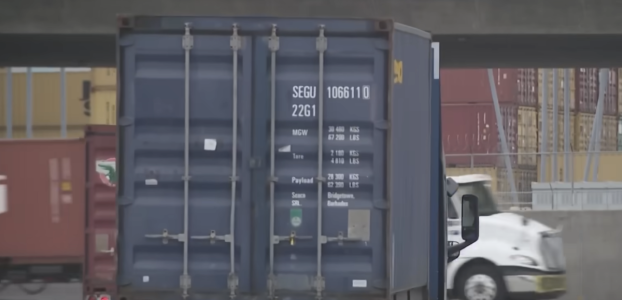How tariffs could affect your everyday shopping—and what truckers are bracing for
By
Veronica E.
- Replies 0
For many of us, it’s easy to overlook how goods make it from ports to store shelves.
But behind the scenes, truckers play a critical role in keeping the economy moving.
Now, that rhythm may be slowing.
The US trucking industry is beginning to feel the strain of new tariffs, and the effects could trickle down into everyday purchases—possibly changing how much Americans pay and can find on shelves.
The trucking industry often reflects the broader state of the US economy.
When freight is moving, so is business.
But according to Craig Fuller, founder of FreightWaves, trucking volumes have dropped to levels last seen before the pandemic—a warning sign for what may come.

Using data from the real-time freight platform Sonar, Fuller estimates another 3–4% decline in volumes in the coming month.
At the Port of Los Angeles alone, container volumes have already fallen by 20% compared to last year.
With fewer goods arriving, fewer trucks are hitting the roads—and that could affect everything from local jobs to nationwide product availability.
Also read: Trade tensions rise between US and Canada—tariff decisions pending
Tariffs and trade tensions: a slow drag on freight
One of the driving factors behind this slowdown is the increase in tariffs—import taxes that can make goods more expensive to bring in.
These trade shifts, which have been developing for several years, are now starting to shape consumer access and business costs.
The International Monetary Fund has already lowered its outlook for both global and US economic growth, citing continued uncertainty around trade policy.
John Crum, head of specialty equipment finance at Wells Fargo, noted that freight carriers are "heavily dependent on the health of the US economy," and added that many in the industry are holding off on sharing their forecasts until there’s more clarity on the outcome of the tariffs.
Source: X / @FreightAlley.
Also read: Tariff trouble? Why a growing boycott from Canada could cost American tourism $6 billion
What this means for consumers
Trucking isn’t just about logistics—it’s about how goods flow to stores, businesses, and homes.
Nearly 40% of domestic freight moved by truck comes from imported goods.
So when imports slow down, shelves may not be restocked as quickly, and prices could rise.
Also read: New trade tariffs could spike grocery prices—here’s how to stay ahead
While there was some hope earlier this year for a slight freight increase, outlooks have shifted.
Industry leaders are sounding more cautious, and small businesses are rushing to build up inventory before more tariff changes take effect.
A slowdown in trucking doesn’t just mean fewer deliveries—it can also lead to job cuts.
Mack Trucks, for instance, recently announced layoffs at a Pennsylvania plant, citing concerns about future demand.
The move sparked strong pushback from Pennsylvania Governor Josh Shapiro, who voiced concern last week about the broader impact of tariffs.
“I fear that we’re going to see more like this,” he warned, adding, “We’re going to see more rising prices, more layoffs, more companies not investing in the future.”
Though some experts have offered comparisons to past economic slowdowns, the focus now is on how to ease the pressure on supply chains—and in turn, protect both workers and consumers.
Understanding the links between tariffs, trade, and trucking helps us better prepare for changes ahead.
Whether it’s adjusting shopping habits or keeping an eye on the economy, staying informed can help consumers feel more in control—even when market conditions feel uncertain.
Read next: Temu and Shein prices are going up—Here’s why and what you can do

Have you noticed any changes in product availability or prices lately? Do you think trade policies like tariffs should be adjusted to protect consumers and workers? How do you feel about the trucking industry's role in the economy today? Share your thoughts in the comments—we’d love to hear from you!
But behind the scenes, truckers play a critical role in keeping the economy moving.
Now, that rhythm may be slowing.
The US trucking industry is beginning to feel the strain of new tariffs, and the effects could trickle down into everyday purchases—possibly changing how much Americans pay and can find on shelves.
The trucking industry often reflects the broader state of the US economy.
When freight is moving, so is business.
But according to Craig Fuller, founder of FreightWaves, trucking volumes have dropped to levels last seen before the pandemic—a warning sign for what may come.

Shifts in the trucking industry are raising concerns about supply chains, pricing, and everyday consumer access. Image Source: YouTube / NewsNation.
Using data from the real-time freight platform Sonar, Fuller estimates another 3–4% decline in volumes in the coming month.
At the Port of Los Angeles alone, container volumes have already fallen by 20% compared to last year.
With fewer goods arriving, fewer trucks are hitting the roads—and that could affect everything from local jobs to nationwide product availability.
Also read: Trade tensions rise between US and Canada—tariff decisions pending
Tariffs and trade tensions: a slow drag on freight
One of the driving factors behind this slowdown is the increase in tariffs—import taxes that can make goods more expensive to bring in.
These trade shifts, which have been developing for several years, are now starting to shape consumer access and business costs.
The International Monetary Fund has already lowered its outlook for both global and US economic growth, citing continued uncertainty around trade policy.
John Crum, head of specialty equipment finance at Wells Fargo, noted that freight carriers are "heavily dependent on the health of the US economy," and added that many in the industry are holding off on sharing their forecasts until there’s more clarity on the outcome of the tariffs.
Source: X / @FreightAlley.
Also read: Tariff trouble? Why a growing boycott from Canada could cost American tourism $6 billion
What this means for consumers
Trucking isn’t just about logistics—it’s about how goods flow to stores, businesses, and homes.
Nearly 40% of domestic freight moved by truck comes from imported goods.
So when imports slow down, shelves may not be restocked as quickly, and prices could rise.
Also read: New trade tariffs could spike grocery prices—here’s how to stay ahead
While there was some hope earlier this year for a slight freight increase, outlooks have shifted.
Industry leaders are sounding more cautious, and small businesses are rushing to build up inventory before more tariff changes take effect.
A slowdown in trucking doesn’t just mean fewer deliveries—it can also lead to job cuts.
Mack Trucks, for instance, recently announced layoffs at a Pennsylvania plant, citing concerns about future demand.
The move sparked strong pushback from Pennsylvania Governor Josh Shapiro, who voiced concern last week about the broader impact of tariffs.
“I fear that we’re going to see more like this,” he warned, adding, “We’re going to see more rising prices, more layoffs, more companies not investing in the future.”
Though some experts have offered comparisons to past economic slowdowns, the focus now is on how to ease the pressure on supply chains—and in turn, protect both workers and consumers.
Understanding the links between tariffs, trade, and trucking helps us better prepare for changes ahead.
Whether it’s adjusting shopping habits or keeping an eye on the economy, staying informed can help consumers feel more in control—even when market conditions feel uncertain.
Read next: Temu and Shein prices are going up—Here’s why and what you can do
Key Takeaways
- US trucking volumes are decreasing, and forecasts suggest continued declines tied to trade tensions.
- The Port of Los Angeles has seen a 20% drop in container volume, signaling potential supply chain strain.
- Global and US growth forecasts have been lowered, with trade policy uncertainty playing a role.
- Reduced freight movement may lead to higher consumer prices and fewer goods on store shelves.
- Layoffs in trucking-related jobs have already begun, raising concerns about long-term economic impacts.
Have you noticed any changes in product availability or prices lately? Do you think trade policies like tariffs should be adjusted to protect consumers and workers? How do you feel about the trucking industry's role in the economy today? Share your thoughts in the comments—we’d love to hear from you!






